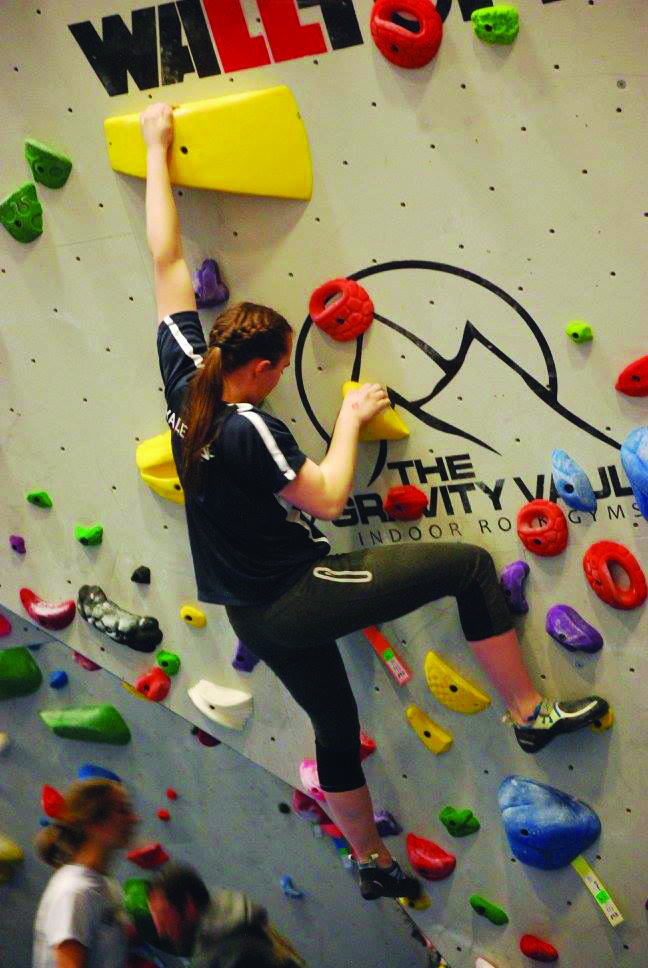
Yale Climbing Team
With no coach or reserved facility, the Yale climbing team does not seem set up for success. But the growing team does not let these limitations hold it back.
While just a few years ago the climbing team had few members and little hope for competitiveness, Josh Cofsky ’15 and Riley Rice ’15 did not let the organization flounder. Instead, they set the team on a trajectory of continued growth and climbing excellence. With the pair as captains, the team doubled, then tripled in size. Just a few years into the team’s resurgence, the Yale climbers placed first at the 2017 regional championship this past weekend, finishing third in the region’s final season standings.
“I thought it was really cool to see the whole team working together,” Cady van Assendelft ’19 said. “Instead of us having a couple members of the team do well, we had the whole team come in first.”
The climbing team, which started in 2012 with less than five members, according to Dante Archangeli ’17, now has over 100 official members, including 20 to 25 athletes who regularly compete across the region. Though the team has always had some experienced climbers, including Archangeli and Grace Stonecipher ’17, the Bulldogs had previously not competed with the region’s top teams as a group. This year’s success is partially due to an influx in talent; Ceri Godinez ’17, who came onto the team with little climbing experience, is now one of the best climbers.
Three events comprise climbing meets: bouldering, speed climbing and sport climbing. In previous competitions, the team allowed its members to decide for themselves in which events they would compete; often, several Yale climbers would compete in the same event. At the regional tournament, however, captains Max Farbman ’18 and Andrew Kilby ’18 made sure athletes were evenly distributed across the three disciplines.
This redistribution paid off, as Yale took first place in the 12-team field with a team score of 802.4, besting second-place UConn by over 12 points and Ivy League rivals Princeton and Columbia by over 300. According to several team members, their success at the regional level is due to this increased organization within the group.
“Before, it would be like running a buttery and telling people to work whenever,” Archangeli said. “[This] was the first time we actually tried to do well.”
Though the team’s best climbers are usually able to succeed in all three events, there are some key differences. In bouldering, athletes climb five different “problems” ranked by difficulty, and speed is not taken into account. Sport climbing is similar, but climbed with a harness unlike bouldering. Without the risk of free-falling to the ground, sport climbers are able to climb higher than boulderers. Speed climbing is the only competition of the three in which speed determines scoring with the winner completing the course with the fastest time.
For climbers, the easiest problems are like “climbing up stairs.” Harder problems are not so simple, as the walls slope and the holds get more difficult.
“On a lot of the hardest routes, they’ll target specific weaknesses,” Archangeli said. “They’ll make you use the same muscle groups throughout.”
While elite climbers are in tremendous physical shape, there is no specific body type that lends itself especially well to climbing, according to team member Michelle Jones ’19: Whereas in basketball, the best players tend to be abnormally tall, great climbers vary in stature.
Also unlike most other sports, both male and female climbers are included in a single team score. Archangeli finished first in both speed climbing and sport climbing and fourth in bouldering, while Godinez, the top female scorer, finished fourth in speed climbing and seventh in bouldering. The team also received strong performances from van Assendelft, Stonecipher, Sylvan Zheng ’17 and Jonathan Chen GRD ’17.
Despite their unity as a team, many Yale climbers approach the sport differently. Farbman said that he determines his goals before the season, alternating between endurance workouts and power workouts to make sure he can climb difficult problems. Kilby, on the other hand, has a much simpler regimen.
“Honestly, I just climb,” he said. “I think the best way to get better at climbing, at least for someone like me who’s only climbed for a few years, is to spend as much time on the wall as possible.”
The Yale climibing team will host Antegravity Fling on April 29 at City Climb Gym to recruit new members.







